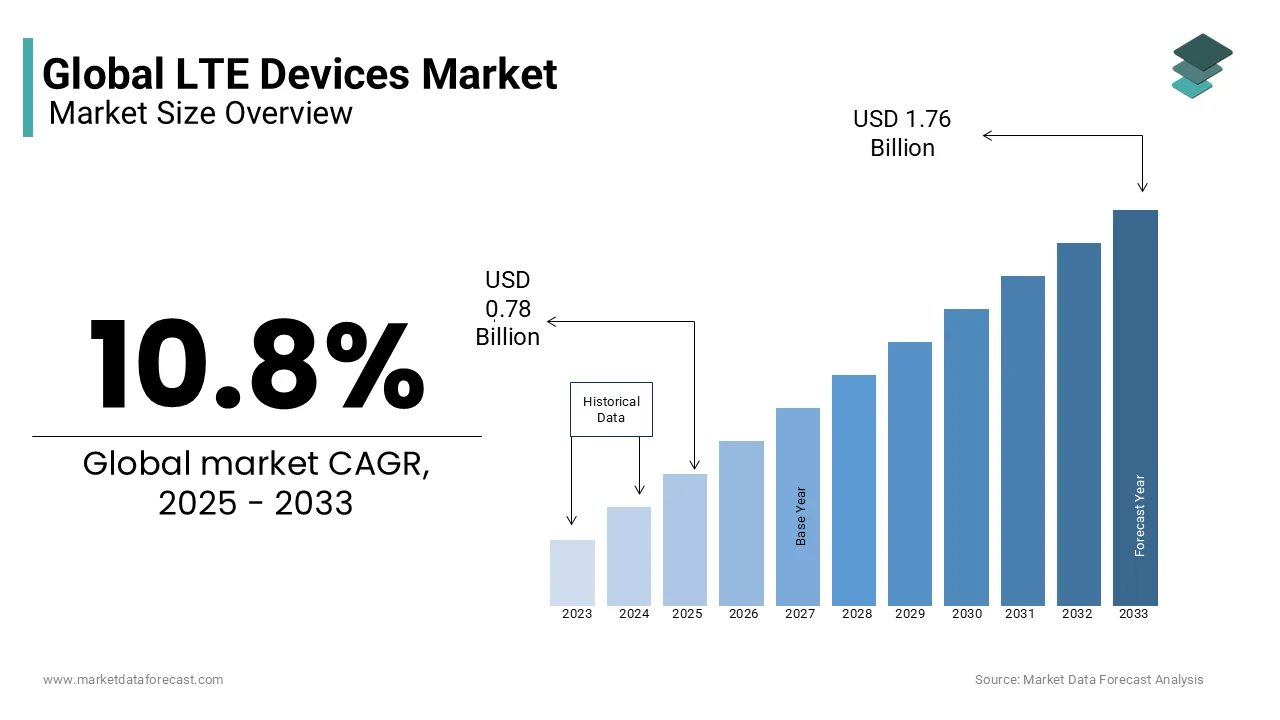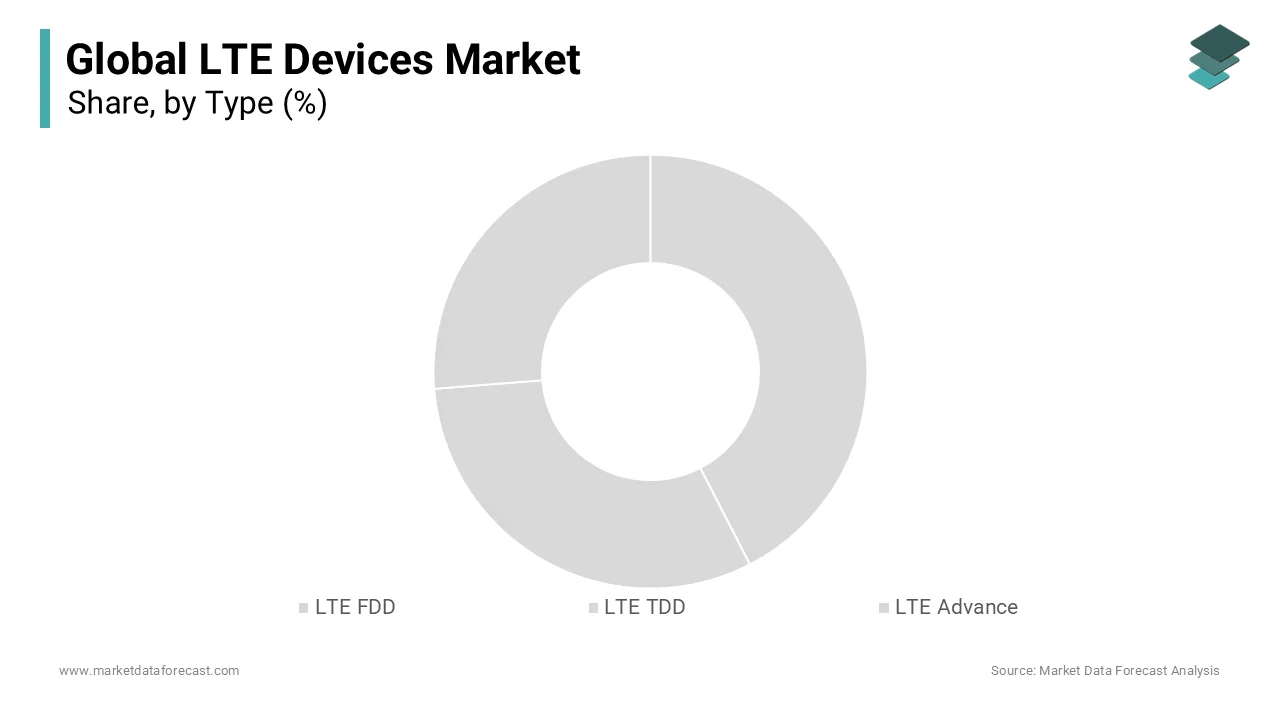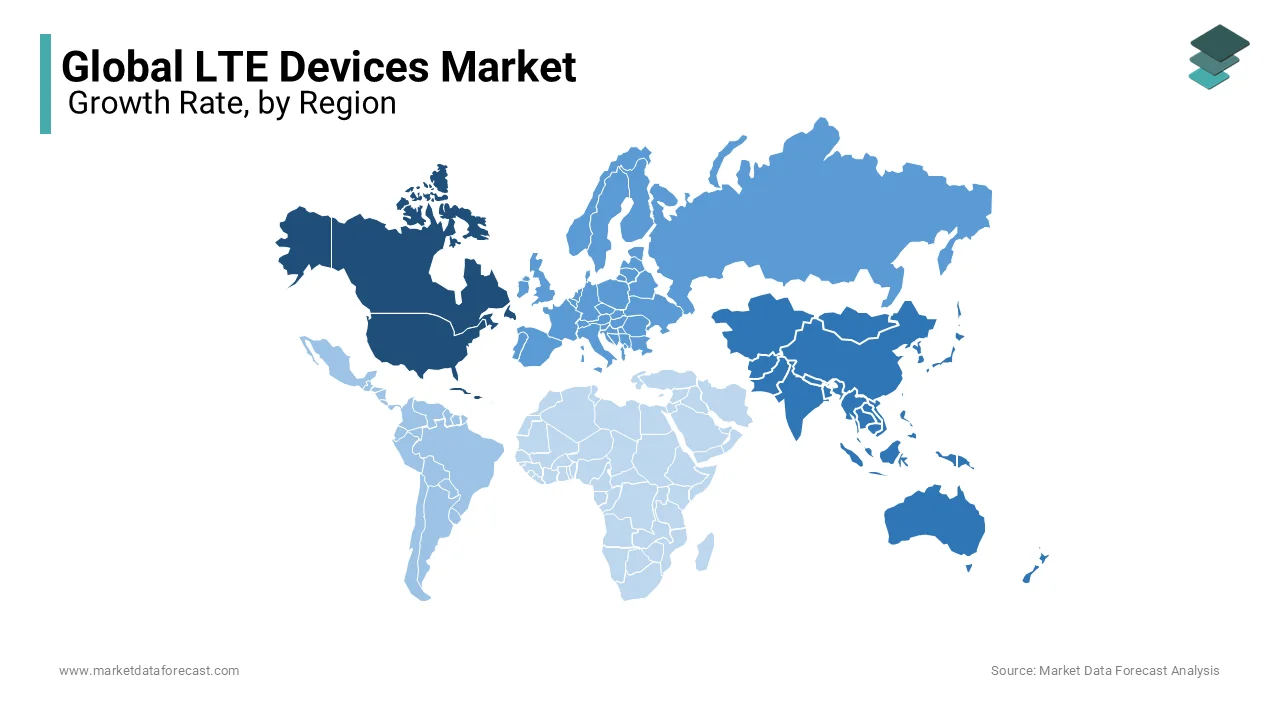Global LTE Devices Market Size, Share, Trends, & Growth Forecast Report By Application (Volte, Surveillance, Browsing And Large Enterprises, M2M And Connected Devices, Public Safety LTE, Video On Demand, Defense And Security), Type (LTE FDD, LTE TDD And LTE Advance) and Region (North America, Europe, Asia Pacific, Latin America, and Middle East & Africa), Industry Analysis From 2024 to 2033
Global LTE Devices Market Size
The size of the global LTE devices market was valued at USD 0.70 billion in 2024. The global market is predicted to reach USD 0.78 billion in 2025 and USD 1.76 billion in 2033, growing at a CAGR of 10.8% during the forecast period 2025 to 2033.

The increasing popularity of on-demand content and seamless mobile data services is a factor that is expected to lead the LTE Devices market during the forecast period. In the telecommunications industry, LTE (Long Term Evolution) is nothing but a standard for wireless broadband communication for mobile devices and for data terminals based on GSM/EDGE and UMTS/HSPA technologies, which increases the capacity as well as the speed using a different radio interface together with core network improvements.
MARKET DRIVERS
Growing need for Connectivity of Devices
The growing need for massive connectivity of devices due to the evolution of IoT is expected to play an essential role in the growth of the LTE Devices market across the globe. Other factors, such as the increasing of LTE devices with the surging penetration of smartphones and the rise of on-demand content and seamless mobile services, technology innovation and advancement, and research and development initiatives, influence the growth of the LTE Devices market during the forecast period. Increasing investments by the primary key players and growing adoption of smartphones from various sector players are some of the major driving factors that promote the growth of the revenue rate of the LTE Devices market during the forecast period. Also, the increasing need for higher data rates and greater spectral efficiency, rise in adoption of public safety LTE, growth in wireless infrastructure, and increasing adoption of managed security services are also some of the major driving factors that help the growth of the market of LTE devices during the outlook period.
MARKET RESTRAINTS
Transitioning from Legacy Infrastructure
Reluctance in transitioning from legacy infrastructure is one of the important barriers to market growth. Also, stringent government regulations and high upfront deployment costs related to core networks and radio networks are restraints that restrain the growth of the LTE Devices market.
Impact of COVID-19 on the Global LTE Devices Market
Due to the COVID-19 pandemic, there has been a gradual decrease in mobile revenue growth since the companies have shut down due to the lockdown restrictions imposed by the government authorities of respective countries to eradicate the spread of the virus. However, as per the analysis from industry experts, the market of LTE devices is expected to increase once the situation becomes normal.
REPORT COVERAGE
|
REPORT METRIC |
DETAILS |
|
Market Size Available |
2023 to 2032 |
|
Base Year |
2023 |
|
Forecast Period |
2024 to 2032 |
|
CAGR |
10.8% |
|
Segments Covered |
By Type, Application, and Region. |
|
Various Analyses Covered |
Global, Regional & Country Level Analysis, Segment-Level Analysis, DROC, PESTLE Analysis, Porter’s Five Forces Analysis, Competitive Landscape, Analyst Overview on Investment Opportunities |
|
Regions Covered |
North America, Europe, APAC, Latin America, Middle East & Africa |
|
Market Leaders Profiled |
Verizon Communication Inc., Mobile Telesystems, Motorola Solutions Inc., Research in Motion, Runcom Technologies Ltd., Alcatel Lucent, AT&T Inc., Altair Semiconductor, Ericsson, LG Electronics, Huawei Technologies Co. Ltd., Samsung Electronics Co. Ltd., Telenor ASA, Vodafone, and ZTE Corporation and Others. |
SEGMENTAL ANALYSIS
By Type Insights
The LTE FDD segment held a prominent share and is expected to remain at the forefront throughout the forecast period.

By Application Insights
Among these segments, the M2M and connected devices segment holds the market share, and this segment is expected to dominate during the forecast period.
REGIONAL ANALYSIS
The North American region holds a prominent share of the market due to factors such as technological advancements and the availability of infrastructure. Favorable government initiatives propel the growth of the market.

Asia Pacific region is expected to increase the market growth due to factors such as increasing demand for LTE devices in some of the region's major economies, such as India, China, and Japan, which boosts the growth of the revenue rate of the enterprise software market during the forecast period. Furthermore, the increasing investments by the major key players of the market for R&D activities and the new advancements in technology are also some of the major driving factors that promote the growth of the revenue rate of the LTE Devices market.
Europe region will gain good profits in the market, followed by the North American and Asia Pacific regions during the outlook period due to factors such as a rise in the adoption of public safety LTE, growth in wireless infrastructure, and increasing adoption of managed security services. Latin America, Middle East & Africa will likely have a significant growth rate in the coming years.
KEY PARTICIPANTS IN THE MARKET
The major companies operating in the global LTE Devices market include Verizon Communication Inc., Mobile Telesystems, Motorola Solutions Inc., Research in Motion, Runcom Technologies Ltd., Alcatel Lucent, AT&T Inc., Altair Semiconductor, Ericsson, LG Electronics, Huawei Technologies Co. Ltd., Samsung Electronics Co. Ltd., Telenor ASA, Vodafone, and ZTE Corporation.
RECENT HAPPENINGS IN THE MARKET
-
Qualcomm Company has announced the next generation 5G fixed wireless access platform with 10 gigabit 5G connectivity for homes and businesses in February 2021. This new platform enables new business opportunities for mobile operators by letting them offer fixed internet wideband services to homes and businesses using their 5G network infrastructure.
-
In November 2020, Huawei company has unveiled an innovative 5G microwave long-reach E-band solution that combines an intelligent beam tracking antenna with the high-power E-band this grouping increases the distance of E-band transmission from 3km to 5km also by providing 20 gb/s capacity.
-
Cisco Company launched a new converged SDN transport solution in March 2020, which enables PLDT to unleash the entire probable of 5G for a superior customer experience.
-
Ericsson Company launched three new radios in February 2021 in their industry-leading massive MIMO portfolio, and the company has expanded its RAN computer portfolio with six RAN compute products to accelerate the 5G mid-band rollouts.
MARKET SEGMENTATION
This research report on the global LTE devices market has been segmented and sub-segmented based on the type, application, and region.
By Type
-
LTE FDD
-
LTE TDD
-
LTE Advance
By Application
-
M2M And Connected Devices
-
Public Safety LTE
-
Volte
-
Surveillance
-
Browsing And Large Enterprises
-
Video On Demand
-
Defense
-
Security
By Region
-
North America
-
The United States
-
Canada
-
Rest of North America
-
-
Europe
-
The United Kingdom
-
Spain
-
Germany
-
Italy
-
France
-
Rest of Europe
-
-
The Asia Pacific
-
India
-
Japan
-
China
-
Australia
-
Singapore
-
Malaysia
-
South Korea
-
New Zealand
-
Southeast Asia
-
-
Latin America
-
Brazil
-
Argentina
-
Mexico
-
Rest of LATAM
-
-
The Middle East and Africa
-
Saudi Arabia
-
UAE
-
Lebanon
-
Jordan
-
Cyprus
-
Frequently Asked Questions
How is 5G impacting the LTE devices market growth globally?
The introduction of 5G technology is driving LTE device market growth by fostering increased demand for compatible devices and infrastructure upgrades.
How is the demand for LTE devices evolving in the era of remote work and digital transformation?
The shift towards remote work and digital transformation initiatives has led to a surge in demand for LTE devices, including smartphones, tablets, and mobile hotspots, to support connectivity needs.
How are technological advancements influencing the LTE devices market landscape?
Continuous technological advancements, such as the development of more efficient chipsets and enhanced network capabilities, are driving innovation in LTE devices, leading to improved performance and user experience.
How do consumer preferences impact the LTE devices market, and what trends are emerging in device preferences?
Consumer preferences for feature-rich smartphones and the increasing demand for IoT devices are shaping the LTE devices market, with a noticeable trend towards devices supporting advanced functionalities.
Related Reports
Access the study in MULTIPLE FORMATS
Purchase options starting from $ 2500
Didn’t find what you’re looking for?
TALK TO OUR ANALYST TEAM
Need something within your budget?
NO WORRIES! WE GOT YOU COVERED!
Call us on: +1 888 702 9696 (U.S Toll Free)
Write to us: [email protected]